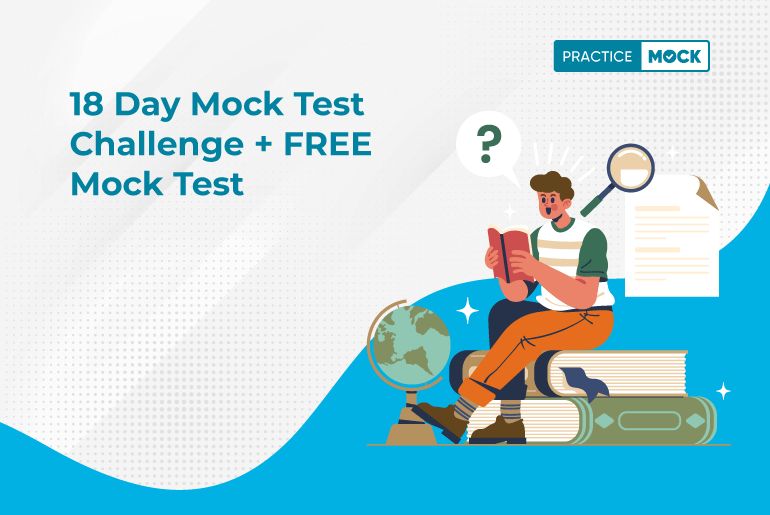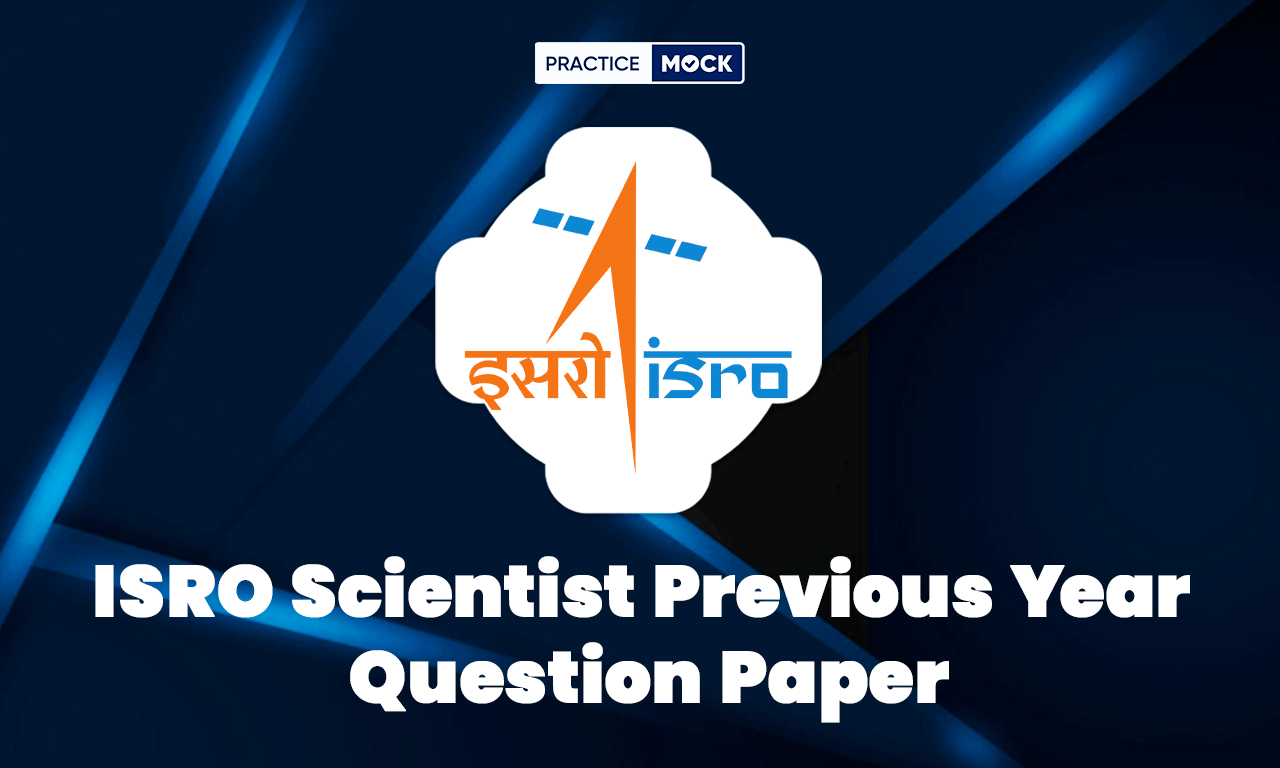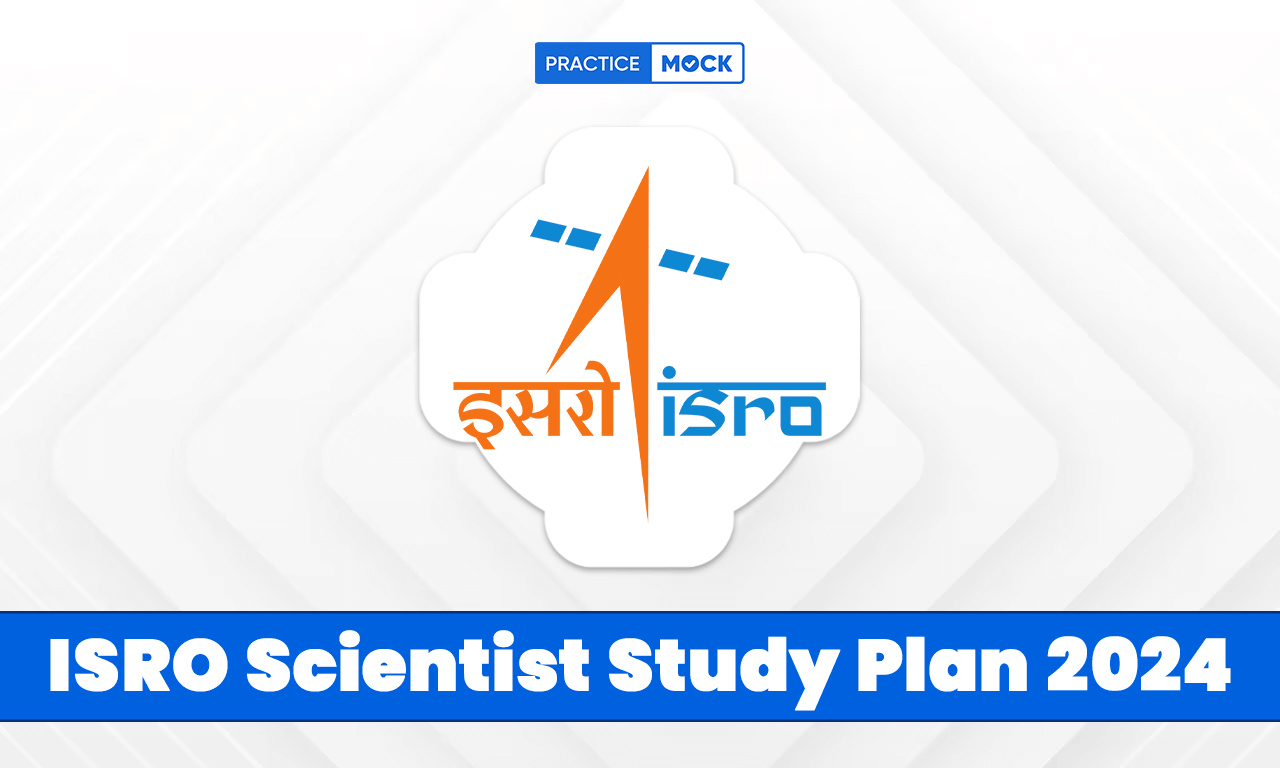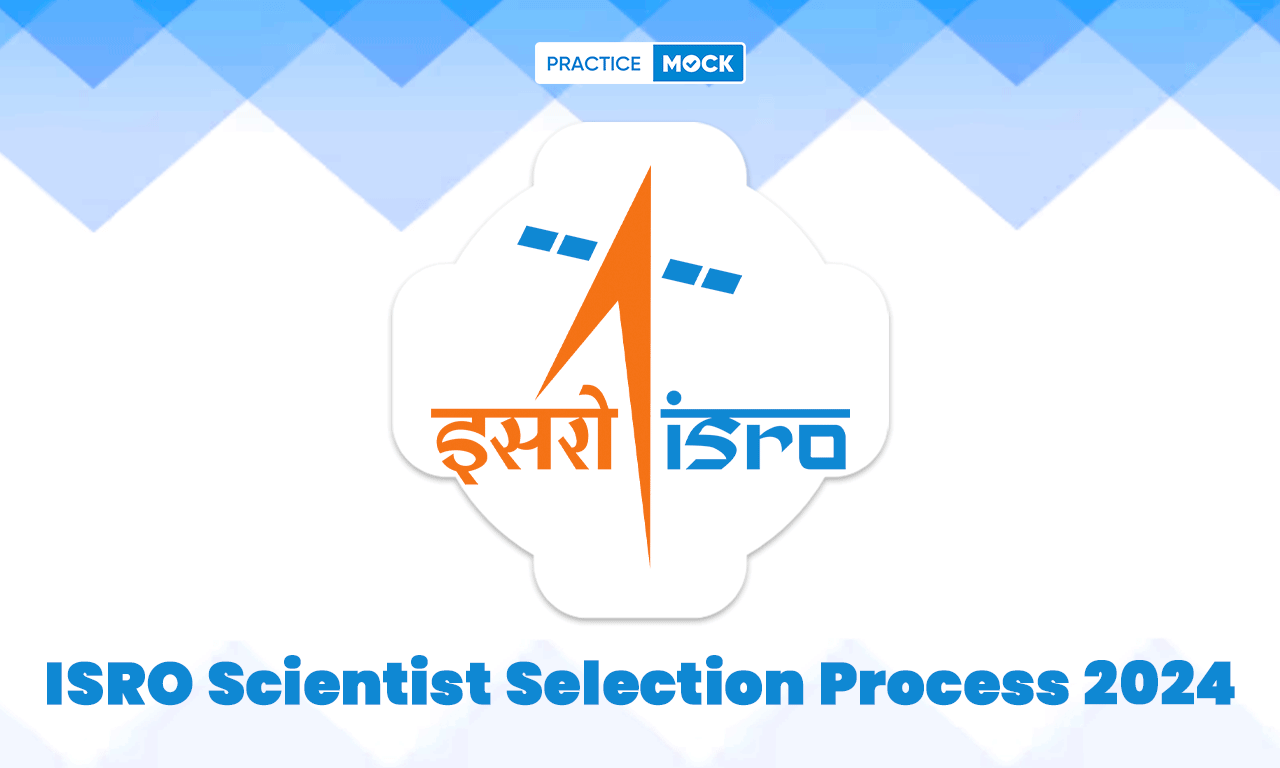

Get ready, the ISRO Scientist 2023 Exam is just around the corner! How many topics have you tackled? Feel confident about your success? Keep up with our daily Mock Test Challenges to gear up for all kinds of ISRO exam questions. Today’s challenge, Day 18, is all about boosting your mental and physical readiness. It’s designed to instill dedication, discipline, and determination – the key ingredients for your exam triumph. If you’re pumped to elevate your ISRO Scientist/Engineer 2023 prep, then this challenge has your name written all over it!
You might also be interested in 30 Days Mock Test Challenge & Important Topics
ISRO Scientist/Engineer Exam Pattern 2023
The ISRO Scientist/Engineer exam is a two-stage process that evaluates your domain knowledge, general aptitude, and personal skills. The written test has 95 objective questions with negative marking, while the interview has 100 marks and assesses your technical and communication skills. To ace the exam, you need to score at least 60% in the written test and impress the interviewers with your personality and expertise.
| Phases | Paper | Questions | Time |
| I | Written Test Part A: Specific Discipline | 80 | Time Duration: 120 minutes (2 Hours) |
| II | Written Test Part B: General Aptitude | 15 |
Click Here 👉to Take a FREE ISRO 2023 Mock Test & Improve Like Never Before!🥈
ISRO Scientist/Engineer Exam 2023: 20-Day Mock Test Extravaganza
Start following this 20 days Mock Test Challenge for ISRO Scientist/Engineer (Mechanical) 2023. You can adjust it according to your preferences and availability. The table shows the topics to cover each day and the number of hours to spend on them.
| Day | Topics |
|---|---|
| 1 | ⭐Take 1 FREE ISRO Scientist Mock Test & Know Your Current AIR👈💻 Go through PYQs. Fluid Mechanics: Fluid properties; fluid statics, manometry, buoyancy, forces on submerged bodies, stability of floating bodies; fluid acceleration; control-volume analysis of mass, momentum and energy; differential equations of continuity and momentum. Turbomachinery: Impulse and reaction principles, velocity diagrams, Pelton-wheel, Francis and Kaplan turbines. |
| 2 | Thermodynamics: Thermodynamic systems and processes; properties of pure substances, behaviour of ideal and real gases; zeroth and first laws of thermodynamics, calculation of work and heat in various processes. |
| 3 | Thermodynamics Applications:– Power Plant Engineering: Air and gas compressors; vapour and gas power cycles, concepts of regeneration and reheat, Boilers, Steam Nozzel, Steam Turbine, Steam Powerplant. I.C. Engines: Air-standard Otto, Diesel and dual cycles, Engine Cooling and Lubrication, IC Engine Performance and Testing. Refrigeration and air-conditioning: Vapour and gas refrigeration and heat pump cycles; properties of moist air, psychrometric chart, basic psychrometric processes. |
| 4 | ⭐Take ISRO Scientist/Engineer (Mechanical) Mock Test 2 + Complete Analysis & Feedback👈💻 Vibrations: Free and forced vibration of single degree of freedom systems, effect of damping; vibration isolation; resonance; critical speeds of shafts. |
| 5 | Design: Design for static and dynamic loading; failure theories; fatigue strength and the S-N diagram; principles of the design of machine elements such as bolted, riveted and welded joints; shafts, gears, rolling and sliding contact bearings, brakes and clutches, springs. |
| 6 | Engineering Mechanics: Free-body diagrams and equilibrium; friction and its applications; trusses and frames; virtual work; kinematics and dynamics of rigid bodies in plane motion. |
| 7 | Strength of Materials: Stress and strain, elastic constants, Poisson’s ratio; Mohr’s circle for plane stress and plane strain; thin cylinders; shear force and bending moment diagrams; bending and shear stresses; deflection of beams; torsion of circular shafts. |
| 8 | ⭐Take ISRO Scientist/Engineer (Mechanical) Mock Test 3 + Complete Analysis & Feedback👈💻 |
| 9 | Theory of Machines: Displacement, velocity and acceleration analysis of plane mechanisms; dynamic analysis of linkages. |
| 10 | Engineering Materials: Structure and properties of engineering materials, phase diagrams, heat treatment, stress-strain diagrams for engineering materials. |
| 11 | ⭐Take ISRO Scientist/Engineer (Mechanical) Mock Test 4 + Complete Analysis & Feedback👈💻 Machining Processes: Basic machine tools (lathe, drilling machine etc.), machining operations (turning, facing etc.), geometry of single point cutting tools (ASA system), cutting fluids/lubricants etc., tool life & wear mechanisms (Taylor’s equation), economics of machining (cutting speed/feed/depth etc.). Metrology & Inspection: Limits/fits/tolerances (IS codes), linear/angular measurements (vernier/micrometer etc.). |
| 12 | Revision/Test Series for Week 1 & Week 2 Topics |
| 13 | Industrial Engineering: Production Planning & Control (PPC): Forecasting models (moving average/exponential smoothing etc.), aggregate production planning/master production schedule/material requirement planning/inventory control/ABC analysis/EOQ models/P & Q systems etc., JIT/lean manufacturing/Kanban system etc., project management techniques (PERT/CPM/crashing/resource levelling etc.). |
| 14 | Engineering Mathematics: Linear Algebra: Matrix algebra, systems of linear equations, eigenvalues and eigenvectors. Calculus: Functions of single variable, limit, continuity and differentiability, mean value theorems, indeterminate forms; evaluation of definite and improper integrals; double and triple integrals; partial derivatives, total derivative, Taylor series (in one and two variables), maxima and minima, Fourier series; gradient, divergence and curl, vector identities, applications of Gauss, Stokes and Green’s theorems, directional derivatives, line, surface and volume integrals, Differential equations: First order equations (linear and nonlinear); higher order linear differential equations with constant coefficients; initial and boundary value problems; Euler-Cauchy equation; Laplace transforms; solutions of heat, wave and Laplace’s equations. |
| 15 | General English: Reading Comprehension Grammar Vocabulary Verbal Ability Synonyms Antonyms Error Spotting Jumbled Sentences Fill in the Blanks |
| 16 | Reasoning Ability: Verbal Reasoning Non-Verbal Reasoning Logical Reasoning Data Interpretation Puzzles Seating Arrangement Coding-Decoding Blood Relations Syllogism Clocks & Calendars Direction & Distance Ordering & Ranking Analogy Series Statement & Assumption Statement & Conclusion Statement & Course of Action Statement, Argument Cause & Effect Inference Decision Making Data Sufficiency Alphabet Test Number System, Decimal Fraction, Simplification, Ratio & Proportion, Unitary Method, Percentage, Time & Distance Time, HCF & LCM & Work Profit & Loss Average Simple Interest Compound Interest Algebra Trigonometry Geometry Mensuration |
| 17 | General Awareness: Current Affairs, Indian Polity, Indian History, Indian Economy. Indian Geography World Geography. Indian Constitution Science & Technology Environment Books & Authors Awards & Honours, Sports Art & Culture National & International Organizations, Important Days |
| 18 | Theory of Machines: Cams; gears and gear trains; flywheels and governors; balancing of reciprocating and rotating masses. Engineering Materials: Casting, Forming and Joining Processes: Different types of castings, design of patterns, moulds and cores; riser and gating design, solidification and cooling. Plastic deformation and yield criteria; fundamentals of hot and cold working processes. |
The ISRO Scientist 2023 Mock Test Challenge Made Easy
This challenge will help you get ready for the ISRO Scientist/Engineer exam. You have to take a practice test every day for ten days in a row. This may seem hard, but it will help you learn more and study better.
This is what you need to do:
Make a Plan: Before you start this challenge, make a plan for how much time you will spend on each part of the exam. This will help you know what you need to work on more and how to study better.
Act Like It’s the Real Exam: When you take each practice test, pretend it’s the real ISRO Scientist/Engineer exam. Find a quiet place with no distractions, use a timer, and follow the time limit for each part.
Check Your Answers: After you finish each practice test, don’t just forget about it. Look at your answers carefully, see how to solve the questions you got wrong, and find out why you made mistakes.
See How You’re Doing: Keep track of your scores and your performance on each practice test. See how much you improved over the ten days and what patterns you notice – are there some parts of the exam that are harder for you? Are there some kinds of questions that always confuse you?
Change Your Plan: Based on how well you did and what you learned, change your plan for the next day’s study. Work on making your weak areas stronger and keeping your strong areas good.
Manage Your Time: One of the important things the challenge will teach you is how to manage your time during the real exam. With daily practice, you’ll get better at using your time wisely.
Takeaway
Stay charged up and focused as the ISRO Scientist 2023 Exam approaches! Assess your topic coverage and believe in your success. Embrace our daily Mock Test Challenges for diverse question practice. Today’s Day 18 challenge enhances your mental and physical readiness, fueling you with dedication and discipline. These traits are your allies for acing the exam. If you’re ready to soar higher in your ISRO Scientist/Engineer 2023 prep, this challenge is your ticket to excellence!
Recent Posts
Punjab and Sind Bank LBO Exam Date 2025 Out, Test on 12th April for 110 Posts
The Punjab and Sind Bank LBO Recruitment 2025 has been released on their official website…
Success Story of Nagella Somanadh Reddy, Cleared IBPS SO I.T Officer
Read the Success Story of Nagella Somanadh Reddy who Cleared IBPS SO I.T Officer to…
RBI Grade B Notification 2025, Check Eligibility, Expected Exam Date, Online Form
Get all the information you need about RBI Grade B 2025 Notification, including Exam Date,…
RBI Grade B Syllabus 2025, for Phase 1, 2 & Interview, Download Free PDF
Download the complete RBI Grade B Syllabus 2025 PDF for Phase 1 and 2. Get…
How to Master Reading Comprehension for RBI Grade B Exam?
Step-by-step guide to mastering Reading Comprehension for RBI Grade B Exam. Improve your skills and…
SSC CGL Sectional Mock Test, Download Free Sectional PDFs
In this blog, we have provided free SSC CGL Sectional Mock Test for overall exam…


